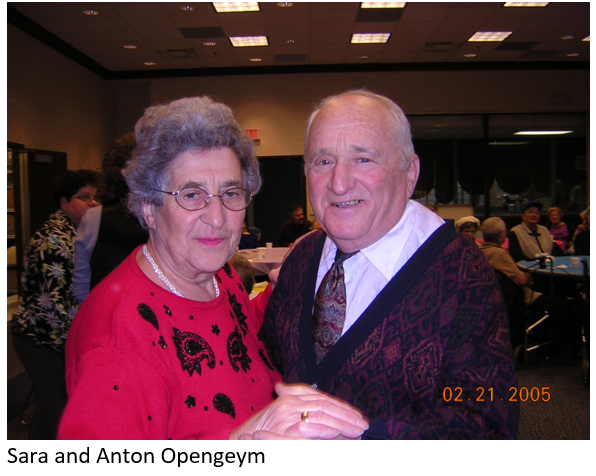Anton Opengeym
"That they should not forget what has happened. Make sure that they understand and pass it on to their children, because I will not be here forever. It is important to understand that you need to have good relationships with those around you "
Name at birth
Abram Openheim
Date of birth
07/01/1925
Where did you grow up?
Riga, Latvia
Name of father, occupation
Yosif Openheim,
Imported and sold herring
Maiden name of mother, occupation
Tauber Rosen,
Homemaker
Immediate family (names, birth order)
Parents and four children: Ben, Hersch, Abram and Max
How many in entire extended family?
15
Who survived the Holocaust?
My mother and brothers, Uncle Abram, Aunt Rosa, and all of my cousins. My father was shot outside the apartment building we owned.
On June 27, 1941 all of the Jews of Riga were organized to get on a train to Russia. During this time, there was bombing going on from German airplanes. We had only minutes to escape, and we were unable to take any belongings with us, only the clothes on our backs.
My mother and brothers and I were all on the train together, but my father did not get on the train, because he was working. A little while after we left the town, the train was hit by a bomb. Everyone ran off of the train and hid in a field nearby. I thought that I was safe, but then the planes came back and began to shoot in the fields.
When the planes left, I stood up and looked; there was blood everywhere, and so many people had died. They put the train back together, and continued on to Moscow where we found work on a farm near the town of Ivanova. We stayed there until fall, but it started to get cold and we did not have clothes for that weather.
We decided to go to Tashkent, Uzbekistan where it would be warmer. I worked very hard picking cotton, with very little food. The Russians also sent me to a vocational school, with other kids my age who were too young to go into the army.
My skill was in bricklaying, and I was sent to a metallurgy plant in Ural, Siberia. The conditions there were very bad, with hardly any food, maybe a small amount of bread and a little soup to last all day. We would try to find potatoes in the fields around us. I was so hungry that many times I did not have the energy to walk back to the barracks. I would sleep in the tunnels under the factory, near the heat pipes. I was very lucky to live because one of the balconies that I was working on collapsed. I was able to jump off while other workers fell and died. I worked there until the end of the war and returned to Riga to find my family.
I had three brothers. Ben was the oldest. He survived the war, fighting in the Russian Army and died in Riga in 1979. Hersch, the next oldest, was a pilot for the Russian army. He never returned after the war, so we think he was shot down and killed. I also had one younger brother, Max, who is still alive. He survived the war with my mother.
I had three brothers. Ben was the oldest. He survived the war, fighting in the Russian Army and died in Riga in 1979. Hersch, the next oldest, was a pilot for the Russian army. He never returned after the war, so we think he was shot down and killed. I also had one younger brother, Max, who is still alive. He survived the war with my mother.
Where were you in the Former Soviet Union?
I worked and lived on a farm near Moscow for 4 or 5 months The metallurgy plant was like a labor camp. The shifts were 12 hours long, laying bricks and concrete to build balconies outside of the plant
Where did you go after being liberated?
I left Russia to return to Riga after the war, where I found my mother and 2 of my brothers. We tried to go back to the apartment that we had owned, but no one was allowed to own anything under communist rule. We shared an apartment with one other family. We lived there from 1950 to 1980, and I worked as a barber.
When did you come to the United States?
Communism did not allow me or my family much opportunity, so I came to Detroit in 1980 with my wife, Sara, and my daughter and granddaughter. The Jewish Federation was helping many Jewish people come to the United States at that time. My mother, brother and nephew came here in 1991. My mother was 100 years old when she came, and she lived to be 105 years old!
Where did you settle?
Oak Park, Michigan
Occupation after the war
Handyman at the Birmingham Temple
When and where were you married?
In Riga in 1951
Spouse
Sara Zugot,
Seamstress
Children
My daughter, Bronya, lives in West Bloomfield. She is a computer engineer at Ford. My son Yosif worked with me at the temple, then at KMart; he died in 1991 of brain cancer
Grandchildren
Two girls from Bronya named Leah and Faina
What do you think helped you to survive?
Fate and Luck kept me alive. It was B'Sheret! (Fate). Also the Russian government, since they kept their borders open and fed me, clothed me. I was young and strong, and that helped too.
What message would you like to leave for future generations?
That they should not forget what has happened. Make sure that they understand and pass it on to their children, because I will not be here forever. It is important to understand that you need to have good relationships with those around you
Interviewer:
Charles Silow
Interview date:
09/15/2009

